初中英语人教版七年级下册unit11how was yourschool trip
人教版七年级英语下册Unit11 How was your school trip说课稿(模版一)

Unit11 How was your school trip?說課稿(模版一)一.教材分析本单元以How was your school trip ? 为中心话题,让学生学会谈论和分享过去发生的事件。
本课以听说的方式围绕着描述“过去发生的事情”展开,学习和运用一般过去时态的一般疑问句Did you go…? Were there any…?二.教学目标1. 语言知识目标词汇:gift shark aquarium seal prize hangout souvenir win autograph 句型:——Did you go to the zoo? ——Yes, I did. /No, I didn’t. I went to the aquarium. ——Were there any sharks? ——Yes, there were. /No, there weren’t any sharks.2. 语言技能目标1).能在本课的任务型活动中进行简单的交流。
2).能运用简单的句子写出过去的活动及感受。
3. 情感目标1)、使学生在人际交往中学会尊重和理解别人。
2)、使学生抒发热爱祖国、热爱大自然的情感三.教学策略开放式教学策略。
兴趣激发策略。
任务型活动策略。
循序渐进和尊重差异策略。
四.学情分析根据所教学生的特点:1、心理特点兴趣:好奇心强记忆:需要多方面刺激思维:偏重于形象思维评价:很在乎他人的评价2、知识基础五.教学重点和难点词汇:hang out souvenir autograph prize 词组:went to the aquarium hung out with …went to the zoo saw some seals had a hamburger bought a souvenir ate some ice cream saw some sharks 句型: 过去时态的两种一般疑问句及简单回答。
人教版七年级英语下册Unit11Howwasyourschooltrip单元复习
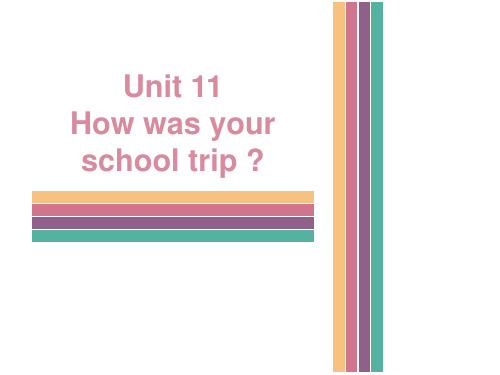
2.__ta_k_e_____ 4.__h_a_d_____ 6._r_o_d_e_____ 8.__b_u_t_____ 10.__a_______
基础复现天天练 Work seriously
●难点释疑 ①go on a school trip意为“参加学校郊 游”。如: All the students went on a school trip last week. 上周所有学生都参加学校郊游活动。 ②worry是动词,意为“担心”。常见一般 搭配为 worry about。如: You don’t need to worry about me.
目录 contents
4 主要语法
主要语法
Work seriously
四、主要语法 用一般过去时询问或描述过去事 件及关感受
★询问对过去事件的感受: 1.—How was your school trip? —It was great. ——你的学校旅行怎么样?——很好。 2.—Were the strawberries good ? —Yes, they were. ——草莓好吃吗?——是的,好吃。
Life on the farm was so much 8 .We went fishing in the early morning, went 9 a walk after
基础复现天天练 Work seriously
supper and watched the 10 at night when the weather was fine.They were very beautiful.
Have 10 nice day! Write to me if you can.
Yours, Lily
2019-2020年人教版英语七年级下册Unit 11 How was your school tr
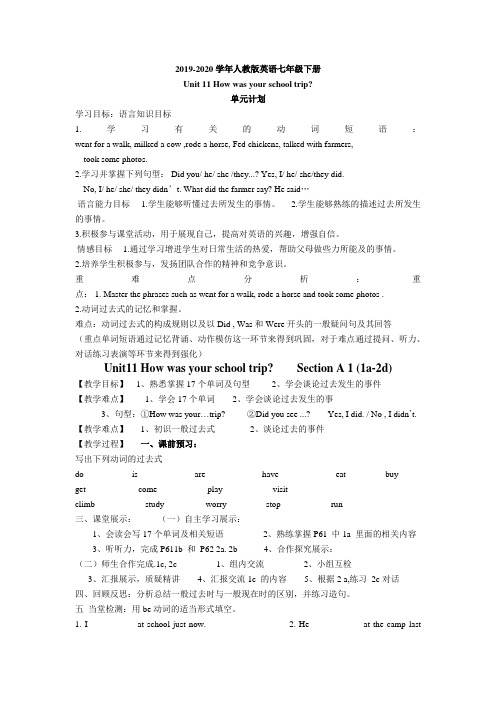
2019-2020学年人教版英语七年级下册Unit 11 How was your school trip?单元计划学习目标:语言知识目标1.学习有关的动词短语:went for a walk, milked a cow ,rode a horse, Fed chickens, talked with farmers,took some photos.2.学习并掌握下列句型: Did you/ he/ she /they...? Yes, I/ he/ she/they did.No, I/ he/ she/ they didn’t. What did the farmer say? He said…语言能力目标 1.学生能够听懂过去所发生的事情。
2.学生能够熟练的描述过去所发生的事情。
3.积极参与课堂活动,用于展现自己,提高对英语的兴趣,增强自信。
情感目标 1.通过学习增进学生对日常生活的热爱,帮助父母做些力所能及的事情。
2.培养学生积极参与,发扬团队合作的精神和竞争意识。
重难点分析:重点: 1. Master the phrases such as went for a walk, rode a horse and took some photos .2.动词过去式的记忆和掌握。
难点:动词过去式的构成规则以及以Did , Was 和 Were 开头的一般疑问句及其回答(重点单词短语通过记忆背诵、动作模仿这一环节来得到巩固,对于难点通过提问、听力、对话练习表演等环节来得到强化)Unit11 How was your school trip? Section A 1 (1a-2d)【教学目标】1、熟悉掌握17个单词及句型2、学会谈论过去发生的事件【教学难点】1、学会17个单词2、学会谈论过去发生的事3、句型:①How was your…trip? ②Did you see ...? Yes, I did. / No , I didn’t. 【教学难点】1、初识一般过去式2、谈论过去的事件【教学过程】一、课前预习:写出下列动词的过去式do______ is_______ are_______ have_______ eat____ buy_____ get______ come ______ play _____ visit______climb ______ study _____ worry_____ stop _____ run_____三、课堂展示:(一)自主学习展示:1、会读会写17个单词及相关短语2、熟练掌握P61 中1a 里面的相关内容3、听听力,完成P611b 和P62 2a. 2b4、合作探究展示:(二)师生合作完成.1c, 2c 1、组内交流2、小组互检3、汇报展示,质疑精讲4、汇报交流1c 的内容5、根据2 a,练习2c对话四、回顾反思:分析总结一般过去时与一般现在时的区别,并练习造句。
人教版七年级下册 Unit 11 How was your school trip 知识点(适合于听写 学生对照背诵)-带答案

人教版七年级下册Unit 11 How was your school trip 知识点1.把...喂给...用...喂养...以...为食...2.一个能干的农夫正在他的大农场耕作。
3.在农场周围散步4.许多/ 许许多多的5.我有很多事情要告诉你。
6.相当漂亮的一个女孩(quite / very )7.你知道关于他的一些事吗?8.带领某人参观某地9.show up / show off / on show10.看见一些有趣的事情11.从某人哪里学到很多关于12.名词前有哪些词时,无介词13.一名优秀的运动员在...方面优秀14.幸运的是,我们及时上了汽车。
15.一般过去时的标志词16.蛮好玩17.你说的太多了18.so many 和so much的区别19.很开心做某事20.担忧某事(worry)2种e out 的含义3种22.天气变得非常的晴朗。
23.长得很好/ 长大/种植水稻24.绘画/ 油画25.去旅行(2种)26.到...去旅行/ 去度假27.沿途/ 顺便问一下/ 以这种方式28.教我们如何制作机器人教某人如何做某事29.教某人某事30.我不知道去哪里/做什么/怎么做31.北京房子的价格很高。
32.总的来说33.让人兴奋的一天34.今天的学校旅行/五分钟的路程35.复合不定代词36.对...感兴趣/37.听到某人做某事/听到某人正在做某事38.不客气(all)39.作文构思40.你的学校旅行怎么样?41.去散步42.给奶牛挤奶43.骑马44.喂鸡45.与农民交谈46.拍一些照片47.带领Alice参观农场48.学习了很多关于农务49.从十二月到六月种植草莓50.摘一些草莓51.带他们回家52.你上周旅行怎么样?54.我去农村拜访我爷爷奶奶了。
55.你做什么了?56.我晚上观看星星了。
57.你真幸运。
58.你去动物园了吗?不,我没有。
我去了农场。
59.你看到一些牛了吗?是的,看到了。
我看到了很多。
新人教版七年级英语下册Unit 11 How was your school trip Sectio

1b. Listen and answer the questions.
4.How to ……疑问句+不定式? They want to know how to make a model plane? 他们想知道如何制作飞机模型?(报纸) 5.take photos=take pictures照相 take a photo /photos of sb 给某人拍照 6.buy——过去式:bought 买 buy sb sth =buy sth for sb 给某人买某物 buy some lovely gift for my parents。 点睛:p74 7. lovely 形容词:可爱的 报纸:Helen has a lovely dog and she likes it very much。 Helen 有一个可爱的狗狗,她非常喜欢它。
2.It is +adj+to do sth 做某事很怎么样。 3.any 用于否定句,此句有didn’t)
(7)There were also too many people and I couldn’t really see or hear the guide. (人也太多而且我也不能看见或听见向导说的 话。)
expensive
3a. Look at the pictures of Bob’s school trip. Complete his diary entry.
2023年人教版七年级英语下册《Unit 11 How was your school trip》句
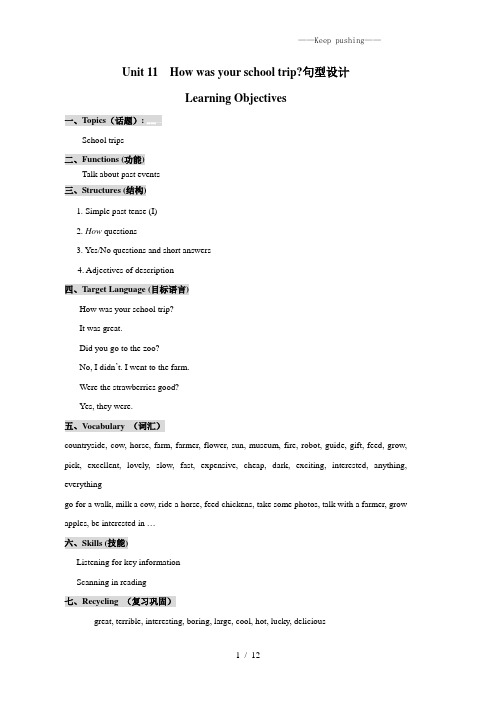
Unit 11 How was your school trip?句型设计Learning Objectives一、Topics(话题):School trips二、Functions (功能)Talk about past events三、Structures (结构)1. Simple past tense (I)2. How questions3. Yes/No questions and short answers4. Adjectives of description四、Target Language (目标语言)How was your school trip?It was great.Did you go to the zoo?No, I didn’t. I went to the farm.Were the strawberries good?Yes, they were.五、Vocabulary (词汇)countryside, cow, horse, farm, farmer, flower, sun, museum, fire, robot, guide, gift, feed, grow, pick, excellent, lovely, slow, fast, expensive, cheap, dark, exciting, interested, anything, everythinggo for a walk, milk a cow, ride a horse, feed chickens, take some photos, talk with a farmer, grow apples, be interested in …六、Skills (技能)Listening for key informationScanning in reading七、Recycling (复习巩固)great, terrible, interesting, boring, large, cool, hot, lucky, delicious八、教材分析本单元的话题是谈论学校郊游,要求学生学会使用一般过去式讲述过去发生的事情,学会用一般过去时写日记。
2020年人教版七年级英语下册Unit11 How was your school trip 要点详解
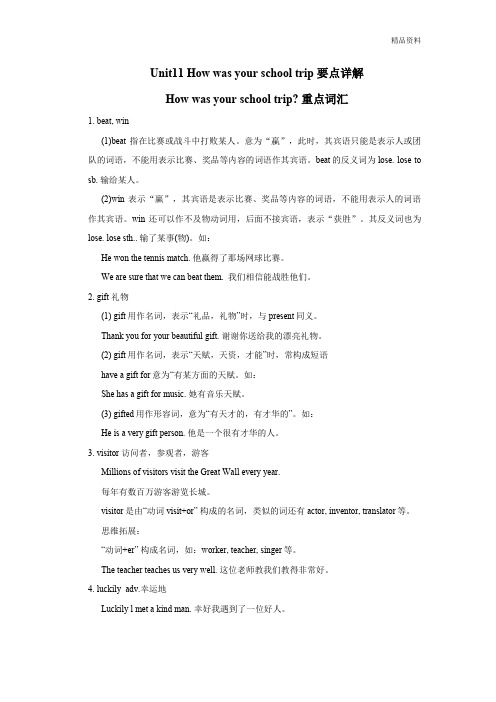
Unit11 How was your school trip 要点详解How was your school trip? 重点词汇1. beat, win(1)beat指在比赛或战斗中打败某人。
意为“蠃”,此时,其宾语只能是表示人或团队的词语,不能用表示比赛、奖品等内容的词语作其宾语。
beat的反义词为lose. lose to sb. 输给某人。
(2)win表示“赢”,其宾语是表示比赛、奖品等内容的词语,不能用表示人的词语作其宾语。
win还可以作不及物动词用,后面不接宾语,表示“获胜”。
其反义词也为lose. lose sth.. 输了某事(物)。
如:He won the tennis match. 他赢得了那场网球比赛。
We are sure that we can beat them. 我们相信能战胜他们。
2. gift 礼物(1) gift用作名词,表示“礼品,礼物”时,与present同义。
Thank you for your beautiful gift. 谢谢你送给我的漂亮礼物。
(2) gift用作名词,表示“天赋,天资,才能”时,常构成短语have a gift for意为“有某方面的天赋。
如:She has a gift for music. 她有音乐天赋。
(3) gifted用作形容词,意为“有天才的,有才华的”。
如:He is a very gift person. 他是一个很有才华的人。
3. visitor 访问者,参观者,游客Millions of visitors visit the Great Wall every year.每年有数百万游客游览长城。
visitor是由“动词visit+or”构成的名词,类似的词还有actor, inventor, translator等。
思维拓展:“动词+er”构成名词,如:worker, teacher, singer等。
The teacher teaches us very well. 这位老师教我们教得非常好。
人教版初中英语七下unit11笔记

Unit 11 How was your school trip?一、单元语法点: 一般过去时1.定义:表示过去某个时间或者某一段时间内发生的动作或存在的状态,也表示过去经常或反复发生的动作.2.句型结构:1)含be 动词am/is→ was are→ were肯定句:主语+was/were + 其他.否定句:主语+was/were + not 其他.一般疑问句:Was/Were +主语+其他?肯定回答:Yes, 主语+was/were ;否定回答:No, 主语+was/were not特殊疑问句:疑问词+一般疑问句(除去句中提问部分)?Eg:Tom was a student ten years ago.Tom wasn’t a student ten years ago.Was Tom a student ten years ago ? Yes, he was; No, he wasn’t.Who was Tom ten years ago ?2)含实义动词(否定句和疑问句借助did)(无人称和单复数的变化)肯定句:主语+动词过去式+ 其他.否定句:主语+didn’t +动词原形+其他.一般疑问句:Did +主语+动词原形+其他?肯定回答:Yes, 主语+did ;否定回答:No, 主语+didn’t.特殊疑问句:疑问词+一般疑问句(除去句中提问部分)?Eg:Tom went to the zoo yesterday.Tom didn’t go to the zoo yesterday .Did Tom go to the zoo yesterday ? Yes, he did; No, he didn’t.What did Tom do yesterday ? When did Tom go to the zoo?3.标志词:(一般以现在作为时间参考点)1)yesterday;2)时间段+ago; ten years /months/weeks .....ago3)last+年/月/周/星期last year/month/week/Sunday.....4)in+年/those days在那些天in 20094.规则动词的过去式变化规则:1).一般情况下在动词原形后+ed.eg:milk →________;talk →________;show→________;pick →________2)以不发音e结尾的+d.eg: live → __________ ;hope → _________ ;use → ________ ;arrive→ ________3).以重读闭音节结尾的动词,双写末尾仅有的辅音字母,再+ed.eg: stop → __________ ;plan → __________ ;drop → _________4).以辅音字母+y结尾的,变y为i+ed.eg:study → __________;carry → __________;worry →;__________5.常用不规则动词的过去式变化(必背)①go → ________ ①ride → ________ ①feed → ________ ①take → ________①do → ________ ①say → ________ ①see → ________ ①grow → ________①eat → ________ ①have/has → ________ ①buy → ________ ①get → ________①come → ________ ①draw → ________ ①know→ ________ ① teach→ ________①make→________ ①swim→________ ①bring → __________ ①cut → ________21.drink → ________ 22.drive → ________ 23.feel → ________ 24.fight → ________25.find →__________ 26.fly → ________ 27.forget →__________ 28.hear → ________ 29.keep → ________ 30.wear → ________ 31.write→ ________ 32. leave → ________ 33.let → ________ 34. lose → ________ 35.meet → ________ 36.pay → ________ 37.put → ________ 38.read → ________ 39.run → ________ 40.sell → ________41.sing → ________ 42.sit → ________ 43.sleep → _______ 44.speak → ________45.spend → ________ 46. stand → ________ 47 tell → ________ 48.think → ________ 49.can→ ________ 50.study→ ________二、常用句型:1.How be .....?=What be .....like ?.....怎么样?How is the weather today?=what’s the weather like today?今天天气如何?How was your school trip?=What was your school trip like?你的学校旅行怎么样?2.How do you feel (about sth) ?=How do you like sth?=What do you think of sth ?你认为....怎样?3.I don’t know how to do it.(it 是do 的宾语)= I don’t know what to do next.(what 和do是动宾关系)我不知道接下来该做什么?三、◆短语归纳1). go for a walk=take/have a walk 去散步2). milk a cow=milk cows 挤牛奶3). ride a horse=ride horses 骑马4). feed chickens 喂小鸡5). talk with 与……谈话6). take photos=take a photo 拍照take some photos拍很多照片7). quite a lot =very相当多8). show… around 带领……参观9). learn about 了解10). from… to… 从……到……11). grow strawberries 种植草莓;grow up 长大/成长;grow into 长成;12). pick strawberries 采草莓; pick up(动副短语)捡起/拿起/接人13). in the countryside 在乡下14). go fishing 去钓鱼;go climbing去爬山;go swimming去游泳;go shopping去购物;go hiking去远足;go skating去滑雪15). at night 在夜晚;at noon 在中午16). a lot of=lots of 许多;大量17). come out 出来/ 开花18). go on a school trip 去学校郊游19). along the way沿线;by the way 顺便说/顺便问一下;on the way to +地点在去....途中On one’s way home 在某人回家途中;20). after that 之后21). all in all 总的来说22).be interested in 对……感兴趣23). not… at all 根本不……not at all 不客气/不用谢24).Sounds great 听起来棒极了.四、理解后记忆:1.复合不定代词:something;everything;anything;nothing;a.后加形容词adj或不定式to do.(修饰词后置)eg: something important一些重要的事情/东西;something to eat一些吃的东西b.作主语时,看成三单,谓语动词用单数.eg: Nothing is impossible.一切皆有可能.c.Something用于肯定句;anything用于疑问句;nothing=not anythingeg:Is there anything to eat ?有任何吃的东西吗?I eat nothing=i don’t eat anything .我什么也没吃.I buy nothing=I didn’t buy anything.我什么也没买.2.study for .....为....而学习eg:Tom is studying for my English test.3.feed sth to sb把....喂给...吃=feed sb with/on sth用....喂....4.sound + adj Sounds great听起来棒极了;sound like+短语/句子eg:It sounds like you like English.5.quite a lot 整体看成是副词adv,修饰动词;eg:I saw quite a lot.我看到很多. quite a lot of +可数名词复数/不可数名词eg:There are quite a lot of books in the library.图书馆有相当多的书.6.ask sb sth=ask sb about sth 询问某人某事ask ab (not)to do sth要求某人(不要)做某事ask sb for sth.向某人要某物ask for help 寻求帮助7.learn to do sth学习做某事;learn ....from....向/从....学习;learn a lot of about...学习/了解很多关于....8.watch sb do sth.观看某人过去做了/经常做某事(强调过程/结果)watch sb doing sth.观看某人正在做某事(强调正在进行)eg:I often watch Tom play basketball after school.我经常看到汤姆在放学之后打篮球.Look, many people watch the monkeys climbing around.看,很多人在看猴子到处爬来爬去.相同类似的用法有:一感feel sb do/doing sth;二听hear/listen to sb do/doing sth ;三让let/make/have do sth ;四看see/watch/look at/notice sb do/doing sth ;另发现find sb do/doing sth → listen 是不及物动词,后面不能直接跟宾语9.teach sb sth教某人某事teach us English教我们英语;teach sb to do sth教某人去做某事10.1)not ...at all(not通常隐藏在谓语动词里)Eg:I don’t like ice-cream at all.我一点也不喜欢冰淇淋.Tom isn’t kind at all.汤姆一点也不善良.2)not at all不客气/不用谢-Thanks -not at all.不用谢11. arrive at+小地点到达小地点;arrive in +大地点到达大地点arrive there/here/home 到达那/这/家12.复习:1)buy sb sth=buy sth for sb买某物给某人; sell sb sth= sell sth to sb.卖某物给某人;2)get on/off bus/train 上/下公共汽车/火车2)too much +不可数名词;too many+可数名词复数;much too+adj/adv3)表建议:let/what about/why don’t you do/why not do五、名词n1.同类一起记:n & vmilk名词:牛奶(不可数名词);动词:挤奶;worry名词:令人发愁的事(可数)/忧虑(不可数);动词:担心(三单worries);fire名词:火(火灾可数;火不可数); 动词:领导/带领;flower名词:;花; 动词:浇花;guide名词:导游; 动词:领导/带领;farm名词:农场; 动词:务农/种田;2.fire station消防站;回顾:radio station/bus station/police station3.打包记忆:farm-farming-farmer六、形容词adj/副词adv1)exciting 常修饰物an exciting day令人兴奋的一天;excited 常修饰人be excited at/about ....某人对....感到兴奋;同理:interesting 常修饰物an interesting news一个有趣的消息;interested 常修饰人be interested in sth/doing sth 对某事/做某事感兴趣2)luck名词幸运-lucky形容词幸运的-unlucky形容词不幸的luckily副词幸运地-unluckily副词不幸地3)ly结尾是adj: lovely可爱的;friendly友好的4)正反义词:expensive昂贵的-cheap便宜的; slow慢的-fast快的5)用an 的形容词:an art museum一个美术博物馆;an exciting news 一个令人兴奋的消息;an excellent actist一个杰出的画家;an interesting book 一本有趣的书;七、作文:描述过去发生的事情描述过去经历:框架:时间+地点+和谁+天气+交通方式+所见所闻所尝所做+感受Last weekend, I went to 某地with my parents,the weather was great and we took the train to there, we visited many places in 某地.First of all, we visited ....., then ..........the food were delicious,and the people were friendly.We had great fun in 某地./We were tired but happy.范文:An Exciting TripLast weekend,I went to the museum with my parents.We left at 8:30 in the morning.We went there by bus .It took us about 30 minutes to get to the museum. In the museum,we saw many old and interesting things. We also listened to the guide along the way,he told us many history stories,they are very interesting.And we watched the video about the museum,too. We came back at 5:00 in the afternoon.We were tired but happy and excited.。
人教版七年级下册英语Unit11
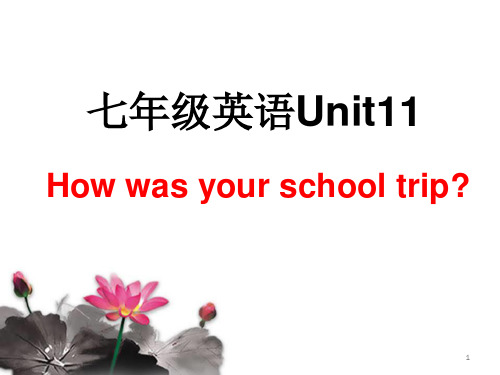
ቤተ መጻሕፍቲ ባይዱ
精讲知识点
知识点1:一般过去时的用法 表示_过__去__某个时间发生的_动__作__ 或_存__在__的__状__态_,常
和表示过去的__时__间___状__语____连用. 标志词:y_e_s__te_r_d__a_y_, _la__s_t n__ig__h_t__, t_w__o__d_a_y__s__a_g_o
man , and then he showed us _C____ his old house
happily.
A. to ; to
B. with ; around
C . to ; around D . with ; to
解析:show sth. to sb. 给某人看… Show sb. around … 领某人参观… 7
箱)。
A. tomatos ; milk B. tomatos ; milks
C. tomatoes ; milk D. tomatoes ; milks 5
知识点二 短语 1
1去散步 go__f_o_r_a__w__a_l_k______ 2给奶牛挤牛奶__m__i_l_k__a___c_o_w___ 3骑马___r_i_d_e__a__h_o__rs__e__________ 4喂鸡__f_e_e_d__c__h_i_c_k_e_n__s_________ 5与......谈话__t_a_l_k__w__i_th___s_b__. ___ 6拍照 _ta__k_e__p__h_o_t_o__s_________ 7相当多;许多___q__u_it_e__a__l_o_t___ 8带领......参观_s_h__o_w__.._.._._.a__ro__u_n__d 9了解 ____l_e_a_r_n__a__b_o_u__t_________
初中英语人教版七年级下册《Unit 11 How was your school trip Sect

They weclohreveea_l_py_.___ and
terrJibimle's&idbeoaring
The train was _s_lo__w___. He's not _in_t_e__re__sted in robots.
New words
dark
dark作形容词,意为“黑暗的”,反义词为 bright,意为“光明的” 天快黑了。 It' s getting dark. [拓展]①dark作形容词,还可意为“(色彩)深 的”;反义词为 light,意为“(色彩)浅的” 我爱好深蓝色。 I like dark blue. ②dark作名词,意为“黑暗;暗处” 她在黑暗中什么也看不见。 She could see nothing in the dark.
Warm-up
S1. WhMS2. WhEenacdhidstyuoduegnot tahdedres?a sentence.
S3. How was the weather there?
S4. WhSohdaidreyyoouugroswtoitrhy.?
New words
fast
fast作副词,意为“快地” 反义词为slowly“慢地 这个男孩跑得快。 The boy runs fast. fast用作形容词,意为“快的” 反义词为slow“慢的 我们可以乘快车。 We can take a fast train.
New words
guide
guide可数名词,意为“导游;向导” 导游带我们参观了博物馆。 The guide showed us around the museum. [拓展] guide及物动词,意为“带领;引导” 她领着她的学生过马路。 She guided her students across the road.
人教版pep英语七年级下册-Unit-11-单元分析

比分析能力。
品店的东西很贵。
分课时教学目标
课时 period 1
period 2
Period 3 Period 4
Period 5
分课时教学目标
学生能够: 1.了解卡罗尔在旅行中做了什么的详细信息,并复述卡罗尔的 旅行经历; 2.正确使用目标语言进行关于旅行的对话。
1.获得埃里克、简和托尼旅行的详细信息; 2.用目标语言复述和谈论这些旅行; 3.从更多方面分享我们自己的旅行,并思考我们可以从旅行中 得到什么。
作业设计 根据农场旅行vlog编写对话(学习理解+应 用实践) 描述自己的一段令人难忘的旅行经历(应 用实践+迁移创新)
利用静态雕像进行故事接龙(应用实践+迁 移创新)
按要求编写和Jim的对话(应用实践+迁移 创新)
写一篇旅行日记(应用实践)
教学内容 语篇类型
Period 4
2b两篇日记 (应用文)
What
Why
How
Helen和Jim的日记,记录了 2b两篇日记是两个人 因为是日记体裁,所以这两
对待同一场学校旅行两人不 对同一场学校旅行截 个语篇均使用第一人称和一
同的感受和评价。
然不同的记录与感受。 般过去时按照旅行发展的顺
Helen认为参观科学博物馆 启发学生对于看待事 序去展开描述,Helen与Jim
行很糟糕,觉得火车很慢车 写作。
lovely, exciting,
厢里面很热,博物馆大且无
terrible, hot, boring等
趣,因为他对机器人不感兴
形成的对比,这不仅考查了
趣。馆内很暗所以他没拍照。
学生对篇章的理解,培养了
而且人很多,他看不清也听
人教新目标版七年级英语下册中考考纲词汇详解: Unit 11 How was your school trip
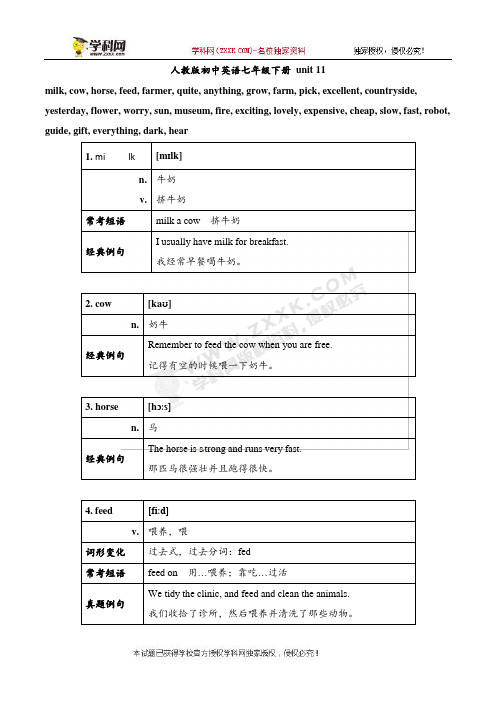
人教版初中英语七年级下册unit 11milk, cow, horse, feed, farmer, quite, anything, grow, farm, pick, excellent, countryside, yesterday, flower, worry, sun, museum, fire, exciting, lovely, expensive, cheap, slow, fast, robot, guide, gift, everything, dark, hear1. mi lk[mɪlk]n. v. 牛奶挤牛奶常考短语milk a cow 挤牛奶经典例句I usually have milk for breakfast.我经常早餐喝牛奶。
2. cow [kaʊ]n. 奶牛经典例句Remember to feed the cow when you are free.记得有空的时候喂一下奶牛。
3. horse [hɔːs]n. 马经典例句The horse is s trong and runs very fast.那匹马很强壮并且跑得很快。
4.feed [fiːd]v. 喂养,喂词形变化过去式,过去分词:fed常考短语feed on 用…喂养;靠吃…过活真题例句We tidy the clinic, and feed and clean the animals.我们收拾了诊所,然后喂养并清洗了那些动物。
5.farmer ['fɑːmə(r)]n. 农夫;农场主词形变化farm n.农场真题例句People should be grateful to a kindhearted farmer named Dan West.人们应该要对一个叫做丹﹒威斯特的好心农民心存感激。
6. quite [kwaɪt]adv. 相当,很常考短语quite a few 相当多真题例句Tom, a twelve – year – old boy, can speak English quite well.汤姆,一个12岁的男孩,能说英语说得很好。
人教版初中英语7年级下册unit11知识清单+习题 (附解答)

七下Unit 11 How was your school trip?一、必会单词:milk v挤奶cow n 奶牛feed v喂养;饲养farmer n.农民;农场主quite adv相当;完全anything pron任何东西;任何事物grow v种植;生长;发育excellent adj极好的;优秀的pick v采;摘countryside n乡村;农村worry v &n担心;担忧luckily adv幸运地;好运地museum n博物馆painting n 油画,绘画exciting adj.使人兴奋的;令人激动的lovely adj可爱的cheap adj.廉价的;便宜的expensive adj.昂贵的slow adj缓慢的;迟缓的fast adv&adj.快地(的)robot n 机器人guide n 导游,向导gift n 礼物,赠品everything pron.所有事物;一切interested adj.感兴趣的dark adj.黑暗的;昏暗的hear v听到;听见二、常考短语:go for a walk去散步milk a cow给奶牛挤奶ride a horse骑马feed chickens 喂鸡talk with与…谈话take photos拍照quite a lot(of)许多show. ..around 带领…参观learn about了解from...to…从…到…grow strawberries种植草莓pick strawberries摘草莓in the countryside在乡下;在农村go fishing去钓鱼at night在夜晚come out出来fire station 消防站go on a school trip参加学校郊游along the way沿途after that之后all in all总的说来take a/ the train乘火车be interested in对……感兴趣not…at all根本不……How be..?…怎么样?How do/does+主语+ feel about….? …对…感觉如何?too many+可数名词复数太多….teach sb. how to do sth.教某人怎样做某事quite a/an+形容词+可数名词单数=a very+形容词+可数名词单数相当/非常…buy sth. for sb.=buy sb.sth.为某人买某物It’s+形容词+ to do sth.做某事是……的。
人教七年级英语下《Unit11HowwasyourschooltripPeriod4》
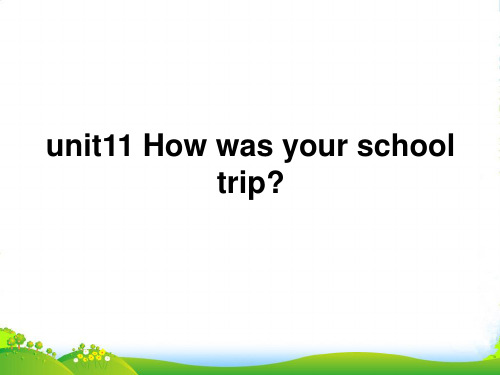
5. My father often
(swim)in this river when he was
young.
答案: 1. was 2. Were 3. visited 4. rode 5. swam
Ⅱ. 句型转换
1. She was a dancer 10 years ago. (改为否定句)
She
的消息时, 每个人激动不已。excited人感到兴奋, 修饰人;
exciting令人兴奋的, 指物体令人兴奋, 修饰物, 故选B。
【习作在线】 四练笔巩固--1师友练笔
请根据下表提示, 以“A Great School Trip”为题写一篇
英语短文, 介绍七年级一班去泰山(Mount Tai)校游的情况。
3. 昨天他参加了学校旅游。
He
a school trip yesterday.
4. 母亲教我如何做早饭。
My mother
me
cook breakfast.
5. 他一点也不喜欢这次旅行。
He
like the trip
.
答案: 3. went on 4. taught; how to 5. didn’t; at all
19. along the way 沿线
20. after that 之后 21. buy sth. for sb. 为某人买某物
22. all in all 总的来说 23. take a / the train 乘火车
一、知识回顾 ---2. 教师点评
【语法总结】一般过去时 (一)一般过去时的定义 一般过去时表示过去某个时间发生的动作或存在
→
(adv. )幸运地; 好运地
7. paint(v. )
人教版七年级英语下册 Unit11How was your school trip_重点知识点
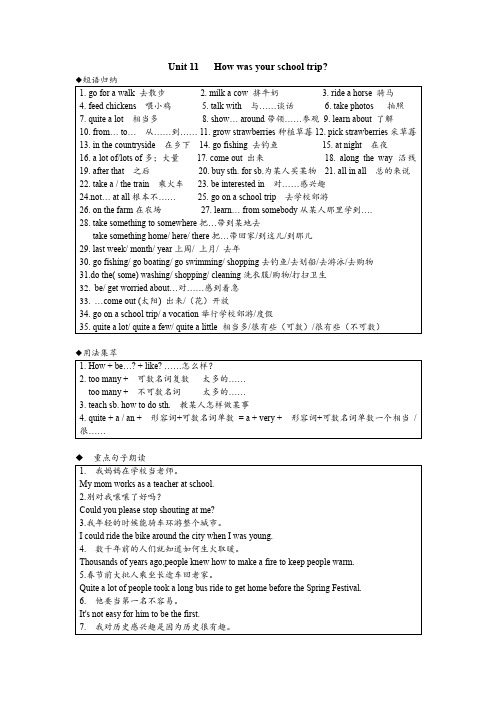
18.乘火车我们很快就到了那儿。
We got there so fast by train.
19.沿途我们看见了些农场和村庄。
We saw some farms and villages along the way.
20.我不知道它们还有本事和我们下棋。
◆用法集萃
1. How + be…? + like? ……怎么样?
2. too many +可数名词复数太多的……
too many +不可数名词太多的……
3. teach sb. how to do sth.教某人怎样做某事
4. quite + a / an +形容词+可数名词单数= a + very +形容词+可数名词单数一个相当/很……
4.数千年前的人们就知道如何生火取暖。
Thousands of years ago,people knew how to make a fire to keep people warm.
5.春节前大批人乘坐长途车回老家。
Quite a lot of people took a long bus ride to get home before the Spring Festival.
22. take a / the train乘火车23. be interested in对……感兴趣
24.not… at all根本不……25. go on a school trip去学校郊游
26.on the farm在农场27. learn… from somebody从某人那里学到….
28. take something to somewhere把…带到某地去
人教版 七年级英语 下册 Unit_11_How_was_your_school_trip

2d Role-play the conversation.
巧记一般过去时
动词一般过去时,表示过去发生事; be用was或用were, have, has变had; 谓语动词过去式,过去时间坐标志; 一般动词加-ed,若是特殊得硬记。 否定句很简单,主语之后didn’t添; 疑问句也不难,did放在主语前; 如果谓语之前有did,谓语动词需还原; 动词若是was,were,否定就把not添。
to June. T F
4 The farmers don’t grow apples. T F
5 Carol picked some strawberries
and took them home.
TF
2c Ask and answer questions about Carol’s visit to the farm. A: What did Carol do? B: She picked some strawberries.
Unit 11
How was your school trip?
Phrases
milk a cow
go for a walk ride a horse
talk with a farmer
pick strawberries
feed chickens
take some photos
visit my grandparents go fishing
2021年1月18日
13
2一般过去时的结构:
(1).主系表 S+was/were+P (2).主谓(宾)S+Ved+(O) (3).There be There was/were+某人、某物+某地、某时
- 1、下载文档前请自行甄别文档内容的完整性,平台不提供额外的编辑、内容补充、找答案等附加服务。
- 2、"仅部分预览"的文档,不可在线预览部分如存在完整性等问题,可反馈申请退款(可完整预览的文档不适用该条件!)。
- 3、如文档侵犯您的权益,请联系客服反馈,我们会尽快为您处理(人工客服工作时间:9:00-18:30)。
Unit 11 How was your school trip? Section B 2a —2c (P65)* 教师寄语:Travel is the road to knowledge.旅行是知识之路。
【学习目标】【学习重点】:根据文章找寻关键信息,提高阅读能力。
【体验学习】:I、预习交流X k B 1 . c o m1. 根据图片和文章标题等,预测新课内容;2. 根据音标拼读单词并牢记;3. 自学课文,勾画出重点和疑惑。
II、翻译官1. exciting___________________2. 可爱的_____________________3. 慢的←→快的______________4. 昂贵的←→便宜的_____________5. 下棋____________________6. 坐火车_____________________7. model robot _______________ 8. 对…感兴趣_________________9.总的说来__________________ 10. not…at all ___________________【课堂导学】:I、新课呈现Step1 Review & Lead-in1.Brainstorming: T: We often use adjectives to describe things. Some describe good things and somedescribe bad things. Can you think of some adjectives?2.Finish2a. Put a √for good and an ×for bad.Step2 Presentation1. Read the diary entries about the school trip and answer the two questions.2. Read again and complete the chart in 2b.3. Group work: read the ad again, try to find the key points. Then say them out one by one. eg:<1> by train = take the train <2> after that <3> ….Step3 Consolidation Read the key points and the article together.II、合作交流Group work: 分析总结阅读技巧,并尝试根据2c中的表格复述文章。
Notes:__________________________________________________________________________________________________________【自主检测】:完形填空June, 15th( ) 1. A. a B. an C. the ( ) 2. A. go B. goes C. went( ) 3. A. get B. got C. gets ( ) 4. A. by B. take C. in( ) 5. A. water B. food C. trip ( ) 6. A. is B. were C. was( ) 7. A. ugly B. difficult C. beautiful ( ) 8. A. friendly B. boring C. expensive( ) 9. A. terrible B. delicious C. exciting ( ) 10. A. happy B. unhappy C. lovely 【快乐链接】:Diary人们常说:要真正学好英语,就要培养用英语思想的能力。
但是,要做到这一点是不容易的。
有一个简单易行的办法可以帮助我们练习用英语思想,那就是用英语写日记。
日记是十分自由的文体,不像作文,必须有正式的主题,讲究文体。
日记是思想,是感情,是内心的一切。
实际上,用英语写日记是最有效的练习英语写作的形式。
它能够让你从各种生活细节及感受中学到最生活化、最地道的英语词语。
可以这么说:如果你能流利地写出好的英语日记,你的英语就已经成功了一大半。
从某种意义上说,写英语日记又是最难的写作,因为它包罗万象,涉及到生活的各个方面,对词汇的要求特别高。
因此,在日常学习中,必须做一个“有心人”,准备一本笔记本,对一些英语的习惯表达法及时记录下来,以便在以后记日记的时候可以使用。
英语日记的写作格式 :日记的第一行,要写年、月、日与星期,然后要写明当天的气候状况,如果是游记,还要写明地点。
日记正文可以是叙事、描述、说明、议论等各种形式。
其实,由于日记是非常随便的,因此常与上述文体结合在一起使用。
日记内容取自生活,可长可短,有时无事可记,一两句也可以。
切忌今天记,明天不记,三天打鱼,两天晒网,破坏了记日记的情趣。
另外,日记也应该尽可能讲究一些文采,切忌写成流水账。
【学习体会】成功&收获: 失败&不足:Unit 11 How was your school trip?Section B 1a — 1d (P64)* 教师寄语:Travel is the road to knowledge.旅行是知识之路。
【学习目标】【学习重点】:继续进一步学习和谈论过去事件。
【体验学习】:I、预习交流1. 根据图片和对话等,预测新课内容;2根据音标拼读单词并牢记;3.自学课文,勾画出重点和疑惑。
II、翻译官1. 去动物园___________________2. 爬山___________________3. 参观博物馆________________4. fire station ______________5. painting ____________________6. 画画__________________【课堂导学】:I、新课呈现Step1 Review & Lead-in Grammar FocusStep2 Presentation1.Learn and finish 1a. Then try to remember the phrase.2.Game: Quick action about the phrases. eg: A: 钓鱼. B: go fishing3.Make sentences by using the phrases in 1a as following.-- I went to the zoo last weekend. -- He climbed a mountain with friends yesterday.Step3 Listening1.Go through the questions in 1a and the chart in 1c quickly.2.Listen and answer the questions in 1b.3.Listen again. What did Jane and Tony do on their last school trip? Check Tony or Jane. Then checkthe answers.Step4 Pair work Ask and answer questions according to the order form.II、合作交流Group work: 总结归纳How…?句型, 如何回答? 请举例说明。
Notes:__________________________________________________________________________________________________________________【自主检测】:I、时态大考验((写出下列动词的过去式))1. visit____________2.climb_______________3. pick_______________4. grow ___________5.draw ____________6. ask _______________7. study ___________ 8.learn ______________ 9. can_______________10. buy ___________ 11.teach______________ 12. eat_______________II、快乐阅读In England, people don’t talk to each other when they travel. If you get on a bus, or in a train, you will sometimes see people sitting and looking out of the window. Other people will be reading books or newspapers.When you meet English people, they often begin a conversation by talking about the weather. So when you meet somebody in England, you can say, “Nice weather for the time of the year!”“But it was a little cold yesterday,” somebody may answer.“But it will get a little warmer later,” you can say.Talk like this, and the English will think, “How friendly you are!”( ) 1. English people often ___________ on the bus. A. talk a lot B. talk to each other C. read newspapers( ) 2. When you meet an English people, you can begin the conversation by talking about the __________.A. weatherB. timeC. food( ) 3.According to the passage, if you talk to English people about the weather, they will think you are ___________.A. English.B. rightC. friendly( ) 4. Which sentence is true? A. English people like traveling by bus.B. English people are unfriendly.C. English people don’t talk much when they’re by train.【学习体会】成功&收获: 失败&不足:Unit 11 How was your school trip? Section B 2a —2c (P65)* 教师寄语:Travel is the road to knowledge.旅行是知识之路。
